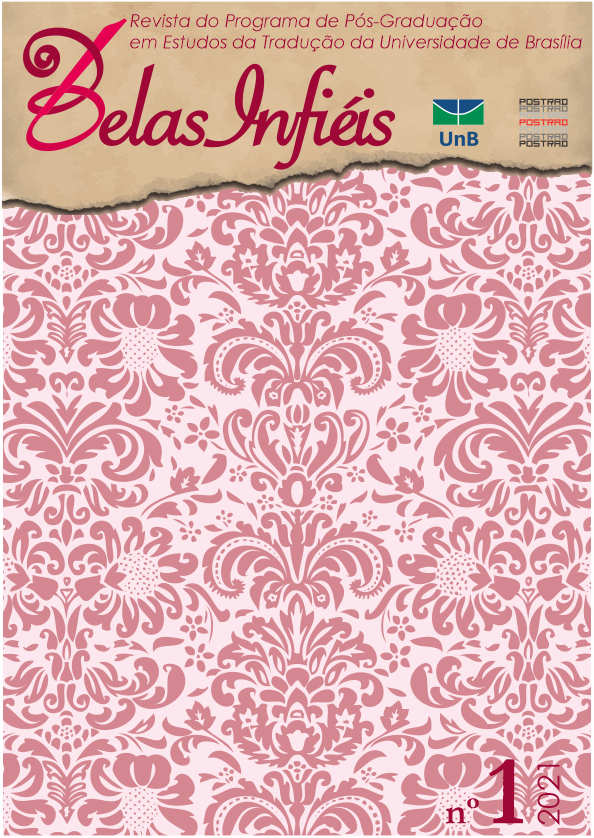Critical Review: De la Hipótesis a la Tesis en Traducción e Interpretación, by Antonio Bueno, Jana Králová and Pedro Mogorrón
DOI :
https://doi.org/10.26512/belasinfieis.v10.n1.2021.35417Mots-clés :
Translation. Interpreting. Research. Translation Theory. Specialised Translation.Résumé
This book review addresses the collective book entitled De la hipótesis a la tesis en Traducción e Interpretación, edited by Antonio Bueno, Jana Králová and Pedro Mogorrón. This work is the output of the Virtual Conference “De la hipótesis a la tesis en Traducción e Interpretación” [From Hypothesis to Thesis in Translation and Interpreting Studies], which was held online by the University of Valladolid (Spain) in February 2019. The book describes the current state-of-the-art concerning Translation and Interpreting Studies within several doctoral programmes of international universities. The 32 chapters composing the book are gathered together around eight different specialised topics.
Téléchargements
Références
Baker, M. (1993). Corpus Linguistics and Translation Studies. Implications and Applications. In M. Baker, G. Frances & E. Tognini-Bonelli (Eds), Text and Technology (pp. 233–250). John Benjamins.
Bowker, L., & Pearson, J. (2002). Working with Specialized Language: A practical guide to using corpora. Routledge.
Bueno García, A., Králová, J., & Mogorrón, P. (Eds.). (2020). De la hipótesis a la tesis en traducción e interpretación. Comares.
Foucault, M. (1992). O que é um autor. Vega.
Laviosa, S. (2010). Corpora. In L. Van Doorslaer & Y. Gambier (Eds.), Handbook of Translation Studies (vol. I, pp. 80–86). John Benjamins.
Martin, J., & White, P. (2005). The Language of Evaluation: Appraisal in English. Palgrave Macmillan.
Munday, J. (2012). Evaluation in Translation: Critical Point of Translator Decision-Making. Routledge.
Vila-Matas, E. (2008). Asasina cultivata. Rao Contemporan.
Téléchargements
Publié-e
Comment citer
Numéro
Rubrique
Licence
© CC BY 2021

Cette œuvre est sous licence Creative Commons Attribution 4.0 International.
Copyright Statement
Given the public access to this journal, the texts are free to use but requires the recognition of the original authorship and initial publication in this journal to be properly stated.
The journal allows the use of works published for non-commercial purposes, including the right to submit the work to publicly accessible databases. Published contributions are the sole and exclusive responsibility of the author(s).
- When submitting papers to be evaluated by the Belas Infiéis journal, the author(s):
- Declare that the contents of the contributions are original and of their original creation, being entirely responsible for their content if there is an objection by third parties.
- Claim to be aware that they should not commit academic plagiarism.
- Declare that the manuscript has not been published, completely or partially, in Portuguese or another language. If it is a translation it should be submitted to the Translated Articles section.
- Declare that the manuscript is not being evaluated by other journals.
- Declare that the manuscript was not submitted to another journal simultaneously.
- Commit(s) to inform the journal of any kind of error or inaccuracy in their contribution (published, in evaluation or in editing) and to collaborate with the editors to make due corrections of the article (when in evaluation or editing) or erratum/retraction (after publication).
- Declare that there is no conflict of interest regarding the published work.
- Authorize its release if it is accepted for publication without any kind of monetary compensation.
- Agree to assign non-exclusive rights to publication to the magazine, remaining free to make their contribution available in other media as long as the publication of the first version in Belas Infiéis magazine is mentioned. They also authorize Belas Infiéis to assign their texts for reproduction in content indexers, virtual libraries and similar platforms.
- Maintain copyright and grant the journal the right of first publication, the work being licensed under theCreative Commons Attribution License.
- Is/Are allowed and encouraged to publish and distribute their work online after the editorial process, which may increase the impact and citation of the published work.
- Authorize the editorial team to make textual adjustments and to adapt the article to the publication rules, when necessary.



















